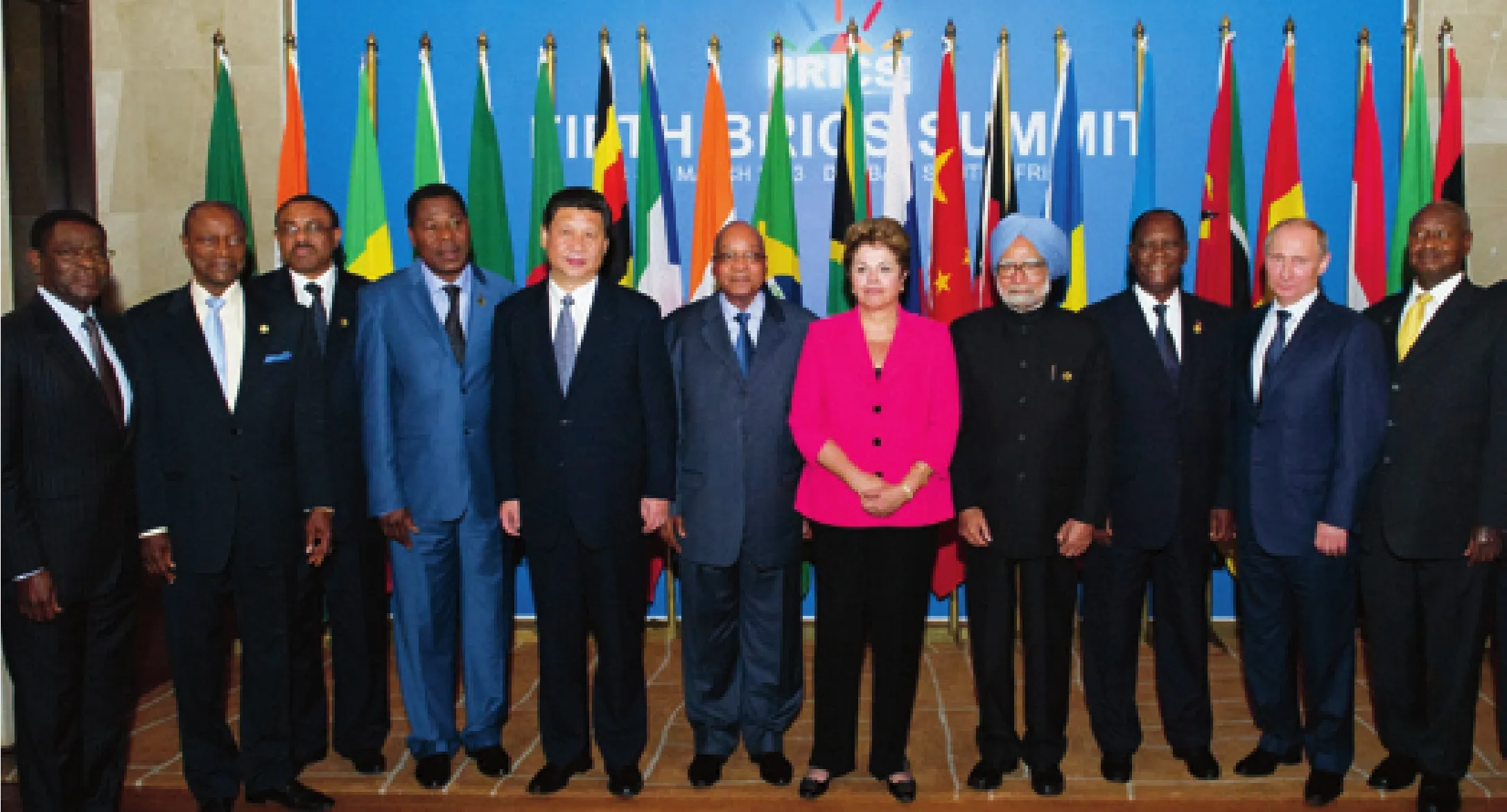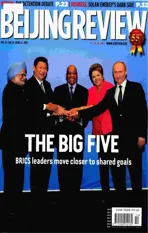BRICS ASSEMBLES IN AFRICA
2013-12-06ByDingYing
By Ding Ying
Emerging economies team up with Africa for greater economic influence

PROMOTED PARTNERSHIP: Participants pose at the BRICS Leaders-Africa Dialogue Forum on March 27 in Durban, South Africa
If the economy is the wheel that drives the world forward, then those countries with the most vigorous economies should play a bigger role in drawing up the blueprint of the future.
Leaders of five major emerging economies in the world—Brazil, Russia, India, China and South Africa, known as BRICS—gathered in Durban, South Africa, on March 26-27 for their fifth summit, a widely watched event that Chinese observers said enhanced their partnership in a wide range of fields, most notably financial services. They argued that improving cooperation among developing countries will help usher in a fairer and more balanced world order.
A significant summit
This year’s summit was very fruitful, with an outcome that will drive further development of the organization, Chen Xulong, Deputy Director of the Department of Global Strategy at the China Institute of International Studies, said to Beijing Review.
The decision to establish a development bank was certainly the brightest outcome of the summit. It can be regarded as one of the greatest achievements since the formal establishment of the BRICS group in 2009, Chen said.While the leaders believed the creation of the bank was “feasible” and “viable,” other details,such as the location and candidate of bank governor, are technical issues that can be resolved through communication and coordination, he added.
As the global financial crisis persists,establishing such a development bank will help stabilize financial markets and satisfy developing countries’ capital demands, said Yuan Gangming, an economist with Tsinghua University.
“The development bank is not built on the basis of stronger powers helping weaker ones.It is a mutual assistance pattern among BRICS countries based on their own efforts. Such cooperation will be more equal and effective,and it will help enhance BRICS members’ status in the international financial system on the whole,” Yuan explained.
Yuan added that China, which possesses adequate foreign exchange reserves, is expected to play a large role in the bank. He believed that if China becomes a major stakeholder, its foreign exchange reserve investment structure will likely be optimized. If the yuan can be included as a form of loan of the bank, it will greatly promote the Chinese currency’s internationalization, Yuan said.
Strengthening cooperation with Africa was chosen as the main focus of BRICS. The leaders of BRICS members and some African countries discussed their cooperation at the First BRICS Leaders-Africa Dialogue Forum with the theme Unlocking Africa’s Potential: BRICS and Africa Cooperation on Infrastructure following the BRICS Summit in Durban.
Chinese President Xi Jinping pointed out that the forum reflected the political will of both sides to realize equality and inclusiveness and seek common development. Xi promised that the Chinese Government is willing to form a cooperative partnership for transnational and trans-regional infrastructure, and help African nations with project consultation, planning, feasibility research and design.
The Chinese leader reaffirmed China’s promise to give zero-tariff treatment to 97 percent of the tariff items of exports to China from the least developed nations that have diplomatic ties with China. China is also planning to help Africa to train 300 managing and technical personnel specializing in infrastructure every year, and encourage Chinese enterprises and financial institutions to participate in infrastructure construction and operation.
“This was the first time that the BRICS summit was held on the African continent, which is very significant to the organization,” said Chen,noting that Africa is a land of brisk development. “BRICS can find more common ground in developing relations with Africa,” said Chen.He said that in addition to its own economic strengthening, South Africa was absorbed into the organization because it represents over 50 African countries.
BRICS and African countries are like-minded friends with extensive common interests, the Chinese president said, noting that the rise of Africa brings opportunities to BRICS countries,just as the development of BRICS countries brings opportunities to the continent.
A confident future
“BRICS has demonstrated its vitality, and it will play a big role in global governance in the future,” Chen said.
Statistics can illustrate the potential possessed by the BRICS. The five major emerging economies cover nearly 30 percent of the land territory of the world, and 42 percent of the world’s population. BRICS countries have made a great contribution to the global economy in the past years. In 2003, the GDP of Brazil, Russia,India and China combined was about 9 percent of the world’s total. By 2009, their share of global GDP had grown to 14 percent. After South Africa joined the group in 2010, BRICS GDP was 18 percent of the global total that year. During the past 10 years, the total GDP of BRICS rose from $3 trillion to $13 trillion.
Chen pointed out that the rapid development of BRICS is based on the members’common interests. “The five emerging countries share the common demand of working together for better development,” he said.
Moreover, BRICS countries share the goals of enhancing developing countries’ role in global governance and enabling them to have a bigger say on international issues.
Furthermore, during the process of their emergence, the five countries will discover greater strategic interests. Their cooperation will thereby deepen in more areas, said Chen.
Since all BRICS members are developing countries, competition in trade and economic areas is inevitable. “Without the mechanism of BRICS, the competition can be cutthroat. But BRICS countries now have a good platform to communicate and control their competition in a healthy direction,” said Chen.
While boosting multilateral cooperation under the BRICS framework, the mechanism provides a platform for bilateral cooperation between BRICS members. During this year’s summit, two agreements between China and Brazil and 10 between South Africa and Russia were signed. China and Brazil signed a financial policy memorandum as well as an agreement on a currency swap to broaden access to financial resources between the two countries whenever the need arises.Russia and South Africa reached agreements on air safety, transportation, energy and science and technology.
According to the action plan issued at the summit, BRICS nations will explore the possibility of strengthening cooperation between their state-owned firms, and promote dialogue among small and medium-sized enterprises.In addition, BRICS members will also consider expanding their cooperation to more sectors including public diplomacy, anti-corruption, drug control, youth exchanges, tourism, energy and sports.
Previously, BRICS countries put more emphasis on development. But in the newly released Durban Declaration, the leaders expressed BRICS concerns over a variety of hotspot issues throughout the world.
According to the declaration, BRICS nations called for the reform of international financial institutions to make them more representative and to reflect the growing weight of BRICS and other developing countries.
“The mechanism is playing a bigger role in coordinating developing countries’ stances on world issues. And this will be helpful for BRICS to act as a whole unit in international forums such as the Group of 20,” Chen stressed. ■
